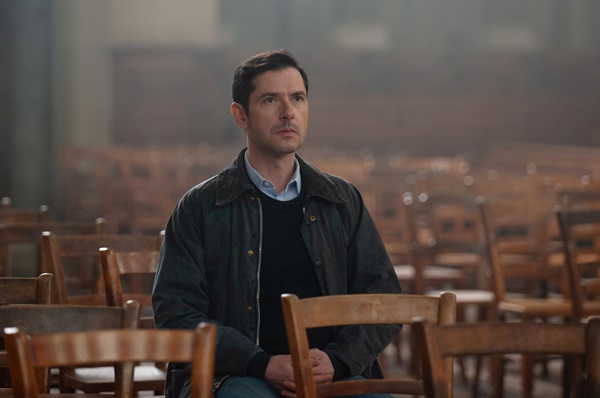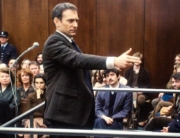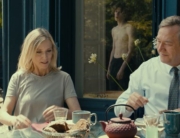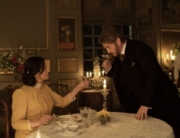
Methodically and steadily, French writer-director François Ozon builds an efficient and damning case against the Catholic diocese of Lyon in his fictionalized account of a real-life pedophile priest hiding in plain sight. But don’t expect the flashy trickster here. Ozon takes a straightforward approach, making this perhaps his most conventional film yet, while drawing out perceptive examinations of the now-adult victims and their families. (Is he the same director who made the wild Double Lover?)
One could look at his new film as Spotlight from a French point of view, except the focus is less an investigative procedural and more a psychological portrait of the abused decades after the crimes were committed. Crucially, Ozon leaves the moral indignation to the audience. There’s no need for speechifying here when the screenplay step-by-step unfolds how the church covered up and protected a priest known for decades as a pedophile. The facts speak for themselves, with emotions kept mostly at a fluctuating simmer.
Some of the particulars will concur with the pattern of behavior by the church hierarchy in other parts of the world, as detailed in Amy Berg’s riveting investigative documentary Deliver Us from Evil (2006), which followed the case of a sexually abusive priest moved from parish to parish in California and eventually to rural Ireland. In Ozon’s film, he is the trusted leader of a scout troop of mainly upper- and middle-class boys in the 1980s through the early ‘90s.
The story line zeros in on three straight men in their thirties and early forties who were all abused by Father Preynat (Bernard Verley). The structure is almost a triptych, with each act centering on an individual man, edited to a different rhythm.
As depicted here, events unravel when Alexandre (Melvil Poupaud), a 40-year-old banker and regular churchgoer with a wife and five children, sends a letter to Cardinal Barbarin (François Marthouret) expressing alarm that Preynat is still teaching Bible studies to children. He reveals for the first time to someone outside of his family that the priest/troop leader fondled him for three years, beginning at a summer camp in 1986; he was considered the cleric’s “chosen one.”
This sets off a confrontation organized by the church, meant as part of the healing process, between Alexandre, the priest, and the moderator, a reassuring, grandmotherly church psychologist, Régine Marie (Martine Erhel). However, Alexandre’s wife, Marie (Aurélia Petit), doesn’t want him to forgive his abuser, warning him that he will continue to be a victim. Although Father Preynat, now in his 70s, admits he molested Alexandre, he stops short of asking forgiveness or acknowledging any repercussions of his actions. It will become clearer as the film moves along why he feels no need to.
Alexandre remains calm during the meeting, which concludes with everyone reciting the Lord’s Prayer, but he later becomes angry at the intransience of the hierarchy; he expects Preynat to be expelled. (As an indication of the backpedaling, the cardinal prefers the term “pedosexual” rather than pedophile to describe Father Preynat.) After the cardinal fails to take action and as Father Preynat continues to teach children and hold mass, Alexandre files a deposition that leads to a police investigation.
A magazine story of the suit catches the eye of thirtysomething, burly François (Denis Ménochet, who creates a completely different persona from his sinister turn in Custody). He announces, first to his parents, that he will publicly accuse Father Preynat of abusing him when he, too, was a scout. Given that François is a few years younger than Alexandre, the statute of limitations hasn’t expired.
The well off François lives out in the country with his own outdoor garage to mete out his frustration on a set of drums in the middle of the night. He also has an advantage in facing the church, the press, and the public scrutiny: supportive parents. Back in 1991, he told them about the molestation, but he didn’t want the priest to be arrested, let alone imprisoned. His folks, in turn, wrote numerous letters to the church demanding that the priest be removed from contact with children. They were told that Preynat was transferred, not that he was still working with young people.
An avowed and proud atheist, François has less to lose than Alexandre, and he fuels his anger at the church and Father Preynat into partnering with another survivor to form the advocacy group La Parole Libérée (Lift the Burden of Silence), which gathers 60 testimonials against the priest. At a well-attended meeting, Ozon nimbly portrays the social strata among them: sitting in the back is Emmanuel (a volatile Swann Arlaud), who rarely speaks up. He’s on the dole, in an abusive relationship, and prone to epileptic seizures—the ripple effect of the damage from the abuse is psychological and physical.
Revelations and rebuttals, voice-overs, and ubiquitous dialogue move the story line along. (Ozon uses actual email correspondence between Alexandre and Cardinal Barbarin.) Though the plotting is straightforward, the efforts first spearheaded by Alexandre lead to one confession and then another, an insider’s tip, numerous setbacks, and more, making the path to justice a jagged one.
Although the tone may be emotionally distant and even-keeled, the film has a power because of its restraint. Given the subject matter, the circumstances contain their own shock/dramatic value. The film also acknowledges that a firm resolution is impossible, as the conclusion hints toward lingering unresolved matters. In fact, after it was released in France last February, further legal developments unfolded over the course of the summer.






Leave A Comment